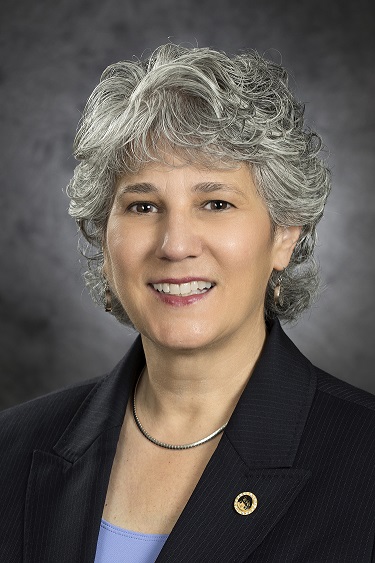In retrospect, Pam Cipriano’s future as a national nursing leader was obvious.
But while Cipriano was pursuing a Ph.D. at the University of Utah College of Nursing, she was simply the go-to co-worker and boss.
“Pam created an environment that was safe and welcoming,” said Vanessa Laurella, an assistant professor at the College of Nursing. Laurella worked with Cipriano at University Hospital 30 years ago. “She was always the lead advocate for the nursing staff on her units.”
Cipriano will be honored as a Distinguished Alum of the University of Utah in a ceremony on Founders Day, March 3. But her colleagues and friends remember her, first and foremost, as a passionate supporter of nurses.
Her long career in healthcare wasn’t a foregone conclusion. The daughter of a custom homebuilder and a homemaker, Cipriano grew up outside Philadelphia. She started college intending to study elementary education. But when that didn’t fit and she shifted to nursing, her Sicilian grandmother thought she was crazy.
Cipriano’s first job after graduating from the Hospital of the University of Pennsylvania’s School of Nursing was as a staff nurse in Salt Lake City at the U. Having been the president of the National Student Nurses Association, she was recruited to join the hospital’s newly formed staff nurse advisory council—part of a core group of student leaders from the Intermountain West who were empowered by hospital administrators.
“Staff didn’t usually rise to the level of having much of a voice back then,” she said. “But we were determined to shake up the place.”
That University Hospital proving ground set her on a trajectory of advocacy for nursing that has defined her career.
Cipriano left Utah a year later to pursue her bachelor’s degree in nursing at American University in Washington, D.C. before she headed back west to pursue a master’s degree with a specialty in burn, trauma, and emergency nursing at the University of Washington.
In 1981, Cipriano returned to Utah as the adult critical care clinical nurse specialist, her “dream job.” Eventually, she became an assistant director of nursing. The healthcare market was volatile, and in 1983, Cipriano had to lay off a number of staff after the federal government changed Medicare reimbursement formulas.
“It was quite an experience for someone who was brand new to management,” Cipriano said. “I can still remember one young woman in tears with black eyeliner and mascara running down her face. That’s one of those things I will never forget.”
In 1984, Cipriano helped organize the move of 300 patients into a then-spanking new University Hospital building over a 36-hour period. To make time for her doctoral studies at the College of Nursing she went to work at Intermountain’s LDS Hospital as the manager of the shock-trauma unit. Her research on labor economics and the impact of unionization and the feminist movement on nursing salaries from 1960 to 1990. And she found a paradox: “Nurses were perceived as already having achieved more independence and ability to dictate what happened in their workplace” than other women. As a result, nursing salaries have lagged, barely keeping up with inflation. And nursing salaries continue to vary based on periodic workforce shortages, Cipriano says.
“Pam always spoke up for patients, their families and the quality of care they should receive,” said Linda Amos, Cipriano’s thesis advisor and emeritus dean of college. “Her passion about the quality of care continued from the time she was a student and throughout her professional career.”
After earning her Ph.D. in 1992 through the college’s distance program, Cipriano taught at Medical University of South Carolina College of Nursing while also working as clinical director of the academic medical center’s cancer center and, later, as director of surgery trauma services. From 1995 to 2000, Cipriano took the helm at Medical University, running operations at a $210 million health care system with 2,600 employees. In 2000, Cipriano moved with her husband and two young daughters to take a post at the University of Virginia as Chief Clinical and Nursing Officer for that academic medical system, managing 3,500 employees and a $350 million budget. In 2010, Cipriano was named the Distinguished Nurse Scholar-in-Residence at the Institute of Medicine (now the National Academy of Medicine). In 2012, she moved into the private sector, working for Galloway Consulting, advising on healthcare management.
Two and a half years ago, Cipriano was elected president of the American Nurses Association, representing the interests of the nation’s 3.6 million registered nurses. In that role, she has spoken out about keeping patients and staff safe during threats like Zika virus, and healthcare reform, more specifically, Obamacare.
The impact of constant change in the healthcare marketplace on nurses—and their patients--is at the forefront of her mind.
“Nurses feel very strongly about protecting the rights of the public to healthcare. There’s an economic concern and a social responsibility,” Cipriano said. “When people can’t afford healthcare, they delay getting needed care, putting off important preventive care or delaying diagnoses, and they get sicker, using the ER as their place of care. It creates a logjam in the healthcare system. That’s why nurses care about healthcare coverage.”
She’s closely monitoring Washington’s talk of repealing and replacing the Affordable Care Act.
Her friends and colleagues back in Utah wouldn’t expect anything less.
“It was very clear she was a champion for nursing and poised for national leadership that would advance the profession,” said Kathi Mooney, a professor at the College of Nursing and former colleague.
College of Nursing Event Announcement
